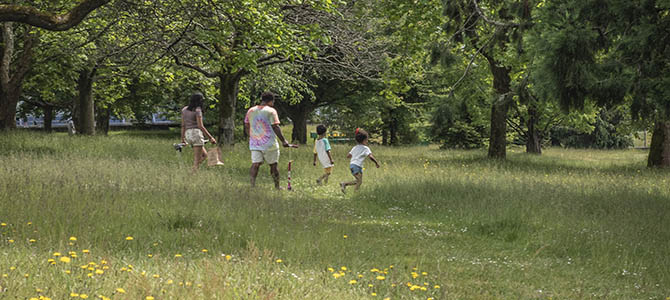
Park Board creating meadows in parks and boulevards throughout city
A recent report provides evidence that intense lawn management practices are responsible for increasing pests and diminishing abundance and diversity of invertebrates and flora, which provide critical nesting habitat and food sources for birds.
Commissioner Dave Demers
The Vancouver Board of Parks and Recreation is piloting 37 hectares of naturalized and wildflower meadows in parks, golf courses, and boulevards throughout Vancouver this year.
The move is part of the Board approved VanPlay Parks and Recreation Services Master Plan which calls for more naturally managed landscapes in parks. This work is additionally supported by the March 10, 2021 Board motion PDF file (710 KB) directing staff to establish incremental targets to defer or alter mowing regimes on appropriate turf surfaces.
Meadow locations
Naturalized and wildflower meadows will be created at 18 parks, including Memorial West, China Creek North, East, Falaise, Killarney, Memorial South, Oak Meadows, Queen Elizabeth, and West Memorial Park, as well as Fraserview, Langara, and McCleery golf courses, and boulevards throughout the city.
Signs will be posted at the meadows to make people aware of the initiative and to encourage exploration via pathways and perimeter trails.
Benefits of meadows
Creating meadows in urban settings for the provision of native or naturalised grasses, wildflowers and flowering plants will attract beneficial insects, butterflies, bees, and birds. In addition, wildflowers add a changing palate of colour to the urban environment throughout the seasons.
Other benefits include improving soil microbes conditions for trees and creating landscapes that are more resilient to changing climate, as well as lower carbon dioxide emissions due to reduced mowing.
Anyone can get involved in supporting pollinators. Get details on how to get involved and a list of plants that pollinators love are available.
Mitigating the impacts of climate change
The Park Board is committed to increasing urban livability, restoring ecological function, and mitigating the impacts of climate change. With climate change as one of the biggest current global challenges, increasing the number of meadows will directly support the City’s Climate Emergency Action Plan, as well as the Climate Change Adaptation Strategy.
Increasing the number of meadows in Vancouver also supports the:
Staff will report back to the Park Board with a summary of data, outcomes, and observations from the meadows’ pilot.
Quotes
Park Board Commissioner Dave Demers
“A recent report provides evidence that intense lawn management practices are responsible for increasing pests and diminishing abundance and diversity of invertebrates and flora, which provide critical nesting habitat and food sources for birds,” said Commissioner Dave Demers, who introduced the motion.
Paula Cruise, Hives for Humanity Garden Manager
“As urban beekeeping increases in popularity, it is critical for bee health to ensure that there is adequate forage within our city. The decision by the Vancouver Board of Parks and Recreation to increase meadows will add greatly to both the abundance and diversity of flowers that provide pollen and nectar for all bees, including our native bees that often have unique forage relationships with particular plant species. The proximity of flower meadows to the city will also connect the urban population with nature, enhancing our understanding of bee conservation and the actions we can all take to provide forage and habitat for pollinators,” said Paula Cruise, Hives for Humanity Garden Manager.
